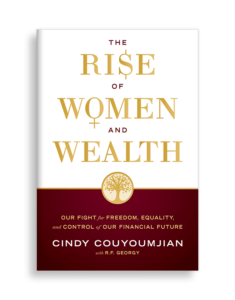 Book Review: The Rise of Women and Wealth: Our Fight for Freedom, Equality, and Control of Our Financial Future by Cindy Couyoumjian (with R.F. Georgy)
Book Review: The Rise of Women and Wealth: Our Fight for Freedom, Equality, and Control of Our Financial Future by Cindy Couyoumjian (with R.F. Georgy)
Women are struggling for equality in every area of society, from wages (54-80% that of men) to leadership (leading only 7.4% of Fortune 500-ranked businesses), and many women defer to men to control their finances. How did we get here? Especially when you consider that women own over half of the investible assets in the U.S. Cindy Couyoumjian gives us a sweeping picture of women, money and power in her new book, The Rise of Women and Wealth: Our Fight for Freedom, Equality, and Control of Our Financial Futures. She shows how women were subjugated through the centuries by our patriarchal society in ways that convinced everyone, even women, that their strengths – like intuition, empathy, nurturing and collaboration – were actually weaknesses, instead of effective leadership qualities.
Cindy cites great thinkers throughout the ages – from Aristotle to Freud – to show how men and women were made to believe women were the weaker sex and should not be allowed to make important decisions governing their lives. This historical perspective is crucial to our understanding for two reasons: one is that women today are collectively traumatized by what came before–“vulnerabilities, doubts, hopes, fears, struggles… and men are carrying collective guilt of the misdeeds of past generations….”. Secondly, Cindy says, “Knowledge is power.” Her passion and purpose are to empower women to pursue “their inalienable right to financial self-determination.” And this book lays the groundwork for women to make that move.
 As part of that groundwork, Cindy also details the advances of feminism, and inspiring women in history who stepped out in front and used their voices and abilities to create truly beneficial change. For example, how many people know that the Suffragist Movement actually began with five women over a quiet cup of tea before the big meeting in Seneca Falls? And who can name the outstanding accomplishments of Francis Perkins in the 1930s? As the longest serving Labor Secretary, Francis was responsible for implementing the Social Security Act, established unemployment benefits, the 40-hour work week, minimum wage, and only failed on implementation of universal health care. Cindy credits Betty Friedan’s book, The Feminine Mystique, for spearheading the second wave of feminism and for getting women out of the kitchen and into the workplace in the 1960’s. She marks the third wave as beginning in the 1990s with Anita Hill’s testimony about Clarence Thomas’ harassment, followed by the #metoo movement voicing protests over toxic masculinity exerting power over women.
As part of that groundwork, Cindy also details the advances of feminism, and inspiring women in history who stepped out in front and used their voices and abilities to create truly beneficial change. For example, how many people know that the Suffragist Movement actually began with five women over a quiet cup of tea before the big meeting in Seneca Falls? And who can name the outstanding accomplishments of Francis Perkins in the 1930s? As the longest serving Labor Secretary, Francis was responsible for implementing the Social Security Act, established unemployment benefits, the 40-hour work week, minimum wage, and only failed on implementation of universal health care. Cindy credits Betty Friedan’s book, The Feminine Mystique, for spearheading the second wave of feminism and for getting women out of the kitchen and into the workplace in the 1960’s. She marks the third wave as beginning in the 1990s with Anita Hill’s testimony about Clarence Thomas’ harassment, followed by the #metoo movement voicing protests over toxic masculinity exerting power over women.
The fourth wave of feminism is about “women, money, and power.” With over 36 years’ experience in the financial industry, Cindy urges women to become financially literate, get engaged with their money and learn how to increase it. She says that women lack confidence to invest because of hardwiring from culture, and she quotes Allianz Insurance as saying, “‘money and investing is in many ways the last – and perhaps the most important – frontier to gender equality.'” While women don’t have it yet, (earning less than men through wages, unpaid caregiving, and living longer than men), they are predicted to inherit “70% of the wealth in America,” amounting to over $30 trillion.
Women taking charge of their economic power and directing their own financial future will revolutionize the world. In the last half of The Rise of Women and Wealth, Cindy turns teacher, explaining why we need to invest, how to maximize your financial security from budgeting and managing credit card debt, and various ways to invest. Possibly the most enlightening portion of the book is her discussion of how hidden factors can undermine your investment return (think politics, economics, government regulations, etc.). None of these risks exist in a vacuum and Cindy illustrates how they interact together (historically and theoretically) and how they should be considered before making investment decisions.
Cindy says that women are poised to create real generational wealth. She believes that when women understand the powerful tool money can become, they will offset the greed and imbalance created by our patriarchal society. She asserts, with many others, that financial literacy should be part of primary school education, so that everyone with a high school degree will start their adult life with the tools they need to be in charge of their finances. Much of that education is included in this book. Whether you think you know your way around investments or don’t even try to balance your checkbook, you’ll enjoy reading this book. It will open your eyes to the way you think about money and inspire you to change your financial future.

